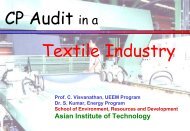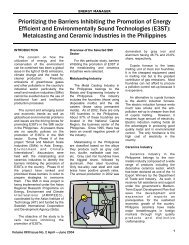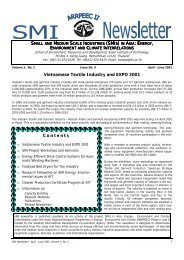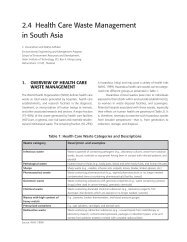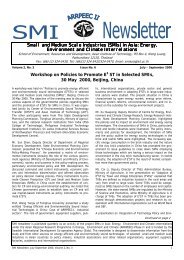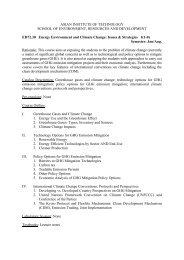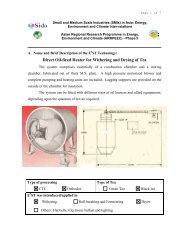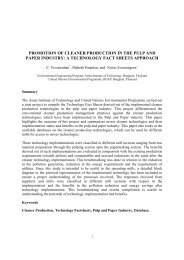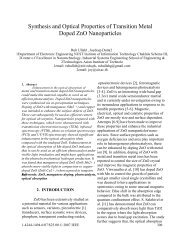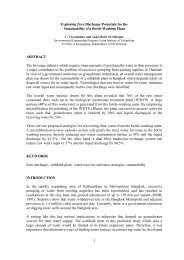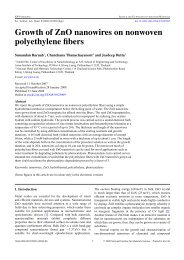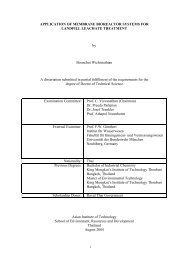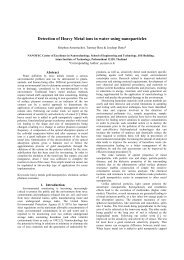A Gap Analysis in Selected Asian Countries, 3R Knowledge Hub ...
A Gap Analysis in Selected Asian Countries, 3R Knowledge Hub ...
A Gap Analysis in Selected Asian Countries, 3R Knowledge Hub ...
You also want an ePaper? Increase the reach of your titles
YUMPU automatically turns print PDFs into web optimized ePapers that Google loves.
42<br />
<strong>3R</strong> <strong>Gap</strong> <strong>Analysis</strong> and F<strong>in</strong>d<strong>in</strong>gs<br />
Urban Municipal Solid Waste Generation<br />
Year<br />
2003 1997<br />
GNP per capita<br />
(US$)<br />
Urban population<br />
(% of total)<br />
Urban MSW generation<br />
(kg/capita/day)<br />
1000<br />
MSW Composition from population us<strong>in</strong>g coal<br />
Source: www.3rkh.net<br />
Of the total solid waste, nearly 60% is generated<br />
from 52 cities hav<strong>in</strong>g a population of over 0.5<br />
million. Ch<strong>in</strong>a had recently surpassed the US as<br />
the world’s largest municipal solid waste<br />
generator, nevertheless with little demonstrated<br />
and concrete waste reduction efforts. With<br />
respect to the amount of MSW generation and its<br />
composition, the waste treatment and disposal<br />
methods are weak. For <strong>in</strong>stance, most of the<br />
generated waste (above 70%) are landfilled<br />
(most of it is simple dumpsite) and 20% has been<br />
composted <strong>in</strong> the past decades.<br />
Informal recycl<strong>in</strong>g activities take place at every<br />
stage and remarkably <strong>in</strong>fluence the waste<br />
stream. Much more waste is generated than<br />
which actually arrives at the disposal site. This<br />
<strong>in</strong>formal recycl<strong>in</strong>g takes place at different stages<br />
from the household, where the waste is<br />
generated till reach<strong>in</strong>g the dumpsites. The share<br />
of recyclable waste exit<strong>in</strong>g the waste stream can<br />
be as high as 60%.<br />
35<br />
1.15<br />
620<br />
30.3<br />
0.79<br />
MSW Composition from population us<strong>in</strong>g gas<br />
Source: www.3rkh.net<br />
F<strong>in</strong>d<strong>in</strong>gs<br />
Ch<strong>in</strong>a’s recycl<strong>in</strong>g rates are lower than most other<br />
countries and likely to be much lower than<br />
<strong>in</strong>tuitively believed. The secondary materials<br />
market <strong>in</strong> Ch<strong>in</strong>a is affected by several factors<br />
<strong>in</strong>clud<strong>in</strong>g: value to the recycler, avoided disposal<br />
costs and price paid <strong>in</strong> the export<strong>in</strong>g country,<br />
avoided disposal costs and price paid to domestic<br />
producers, cost of domestic and <strong>in</strong>ternational<br />
transportation and cost of enact<strong>in</strong>g environmental<br />
safeguards associated with recycl<strong>in</strong>g the material.<br />
Much of the Ch<strong>in</strong>ese recycl<strong>in</strong>g systems are be<strong>in</strong>g<br />
adversely affected by the import of low-cost<br />
secondary materials from high-<strong>in</strong>come countries<br />
that are export<strong>in</strong>g these materials to avoid us<strong>in</strong>g<br />
their limited landfill capacity and pay<strong>in</strong>g their<br />
higher costs of disposal largely due to more<br />
str<strong>in</strong>gent environmental regulatory requirements.<br />
In 2002, the US exported an estimated USD 1.2<br />
billion <strong>in</strong> scrap and secondary materials to Ch<strong>in</strong>a<br />
– up from USD 194 million five years earlier<br />
(World Bank, 2005).<br />
Even though, there is no technological standard<br />
for the recycl<strong>in</strong>g of plastic wastes <strong>in</strong> Ch<strong>in</strong>a, the<br />
law and regulation for recycl<strong>in</strong>g plastic waste has<br />
been enacted and an efficient collect<strong>in</strong>g system<br />
has been formed with the economic development<br />
of Ch<strong>in</strong>a. The recycl<strong>in</strong>g of plastic wastes is<br />
becom<strong>in</strong>g a new attractive field <strong>in</strong> that it can save<br />
resources and protect the environment. From the<br />
view of environmental protection as well as the<br />
economics, a novel and reasonable technology is<br />
needed. This is the responsibility of the governments<br />
and the producers. The reuse of waste plastics,as one<br />
of the avenues to tackle the resource shortness, is<br />
expected to play a vital role <strong>in</strong> the near future. S<strong>in</strong>ce<br />
Ch<strong>in</strong>a produces 29% of the world’s MSW every



